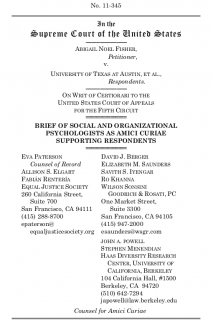The Petitioner, Abigail Fisher, challenged her denial of admission to UT in 2008. The University of Texas automatically admitted students who graduated in the top 10% of their high school class. All other applicants were considered under a ‘holistic’ admission policy that considers many different criteria, including: leadership qualities, extracurricular activities, awards, work experience, community service, family and school socio-economic status, and race.
The brief argues that without a race-conscious admissions policy, falling outside of the top ten percent would effectively deny many Black and Latino students a realistic chance to be considered for admissions to UT. The pathways to opportunity remain uneven across the United States. Black and Latino students’ relative disadvantage in university admissions results from dozens of demographic, social, and economic factors that vary depending on localized conditions, including patterns of racial and economic isolation. The convergence of these factors with race allows UT to consider race as one of many individualized factors as a means to provide a meaningful opportunity for all students to attend UT. Given the number and complexity of variables that contribute to educational outcomes, an admissions policy limited to race-neutral factors cannot capture their cumulative effect on educational opportunity. For these reasons, the brief argues that UT’s plan is narrowly tailored to achieve its compelling interest in diversity.
Haas Institute Director john powell and Assistant Director Stephen Menendian co-authored the brief, relying on a number of sources, including the contributions of Dr. Victoria Plaut, Professor of Law and Social Science at the University of California, Berkeley, who led the coordination of social scientists. Dr. Plaut and students from the Berkeley Law Culture, Diversity & Intergroup Relations Lab helped compile the research for the brief. Nicole Arlette Hirsch, a doctoral candidate in the Department of Sociology at Harvard University, also assisted with the brief. The brief was submitted by legal counsel Eva Paterson, Allison S. Elgart, and Fabián Rentería of the Equal Justice Society; attorneys from Wilson Sonsini Goodrich & Rosati.
After Fisher filed her lawsuit in 2008, a federal judge ruled against her in 2009. On appeal, the U.S. Court of Appeals for the 5th Circuit last year unanimously upheld the lower court’s decision and the constitutionality of UT’s admissions policy. Fisher appealed to the Supreme Court, which will hear arguments in October 2012.
The Equal Justice Society’s press release, with further information, can be found here.





